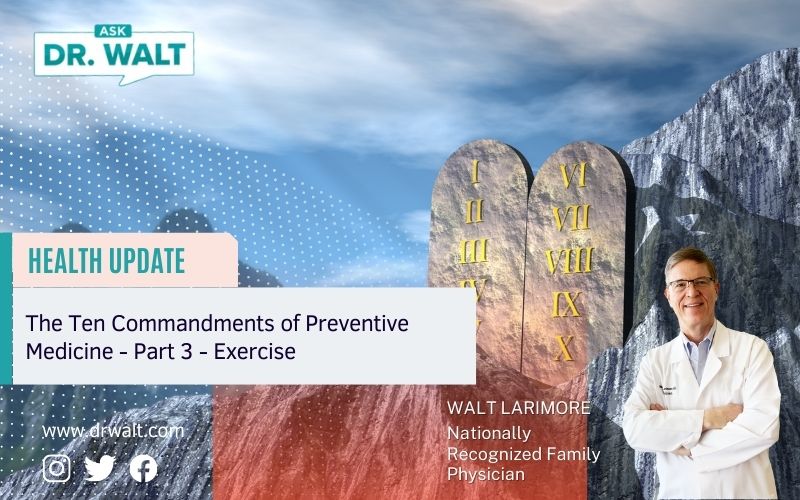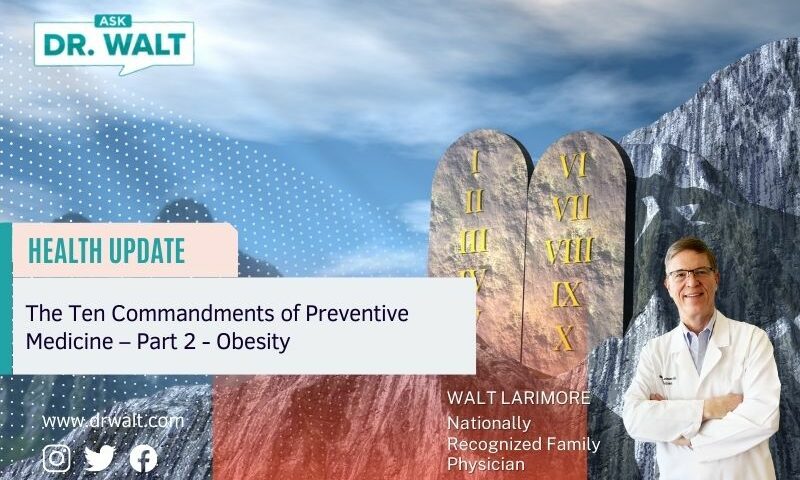12th Day of Christmas – 3
January 6, 2023
The Ten Commandments of Preventive Medicine – Part 3 – Exercise
January 8, 2023In my newest book, 10 Essentials of Happy, Healthy People, I teach people how to utilize the ten essentials that are necessary to live a happy and highly healthy life. Under The Essential of Self-Care, I’ve developed a list of what I call “The 10 Commandments of Preventive Medicine.” Here’s the second installment of this ten-part series.
More information:
These “Ten Commandments,” which I’ve long suggested to my patients and to my radio and television audiences, target exclusively the physical wheel. I suspect we could identify several more commandments related to preventing disease, but these are an excellent start.
Commandment #2 = Avoid or Reduce Obesity
Obesity is now an epidemic in America. Over 70 percent of the adults in the U.S. in 2008 were either overweight, obese or extremely obese—with almost 34 percent being overweight and over 40 percent being obese or extremely obese (weigh at least 30 percent more than normal).
The proportion of people that is overweight has gone up over 40 percent in the last 30 years.
Excess weight is associated with increased heart disease, diabetes, hypertension, stroke, arthritis, depression, fatigue, poor work performance, sleep disruption, gallbladder disease, and several forms of cancer—and that’s only a few of the diseases associated with being overweight.
According to the Journal of the American Medical Association, in 1999 nearly 900 people died every day from weight-related illnesses, almost 325,000 deaths a year—more than the number killed annually by motor vehicle accidents, pneumonia, and airline crashes combined, and three-quarters as many as the 430,000 who die yearly from tobacco-related illness.
And, that was over a decade ago. From 2001 to 2006, health care costs for weight-related illnesses increased 82%, from $167 to $303 billion annually.
Clearly both adults and children could eat better. The surgeon general has recommended that restaurants and fast-food establishments—where Americans spend about 40 percent of their food budget—should offer more nutrition information.
The report suggests that employers include weight management and physical activity counseling in their health insurance coverage and allow employees time to exercise.
Obesity should also be classified as a disease to encourage insurance companies to reimburse for weight control expenses, the report concludes.
We’re all aware that there are more diet plans available in bookstores than the average person could read in a lifetime. And the diet gurus are constantly squabbling over why their diet plan works and no one else’s does. All trustworthy nutrition scientists, however, agree that the keys to good nutrition include variety, moderation, and balance.
There are very few foods that can always be considered good or bad, but there certainly are good and bad nutrition plans—and fad diets.
If you are overweight and are interested in reasonable approaches to nutrition, consider reading my book, SuperSized Kids: How to protect your child from the obesity threat. Also, consider investing in a family consultation with a registered dietician or find a nearby Weight Watchers group.
In the early 1990s, Barb and I improved our dietary habits and began a regular program of walking. I’ve been able to take off twenty-five pounds and keep it off.
If you find that you’re overweight and unable to keep weight off, make an appointment with your physician or a weight-loss specialist to discuss your options. Take action—today—for a healthier future.
To put it simply, to help reduce excess weight and to maintain a healthy weight, eat a balanced healthful diet, reduce your total calorie intake, eat less fat, and exercise regularly.
You may not find a lot of surprises here—but the real questions are these:
- Which of these rules do you need to begin to follow?
- When do you plan to start?
- What strategies will ensure your success?
By beginning with a single step and then continuing to improve on a day-to-day basis, you’ll be on your way to becoming a highly healthy person.
Here are all 10 of the Preventive Medicine Commandments:
- The Ten Commandments of Preventive Medicine – Part 1 – Primary Care
- The Ten Commandments of Preventive Medicine – Part 2 – Obesity
- The Ten Commandments of Preventive Medicine – Part 3 – Exercise
- The Ten Commandments of Preventive Medicine – Part 4 – Marriage
- The Ten Commandments of Preventive Medicine – Part 5 – Dental Health
- The Ten Commandments of Preventive Medicine – Part 6 – Alcohol
- The Ten Commandments of Preventive Medicine – Part 7 – Tobacco
- The Ten Commandments of Preventive Medicine – Part 8 – Alternative Medicine
- The Ten Commandments of Preventive Medicine – Part 9 – Automobile Safety Devices
- The Ten Commandments of Preventive Medicine – Part 10 – Smoke and CO Detectors
And, here are all 10 of the essentials that can be found in my book, 10 Essentials of Happy, Healthy People:
- Set a Wise Balance in Your Life – The Essential of Balance
- Be Proactive in Preventing Disease – The Essential of Self-Care
- Practice Acceptance and Letting Go – The Essential of Forgiveness
- Lighten Your Load – The Essential of Reducing SADness (Stress, Anxiety, and Depression)
- Avoid Loneliness Like the Plague – The Essential of Healthy Relationships
- Cultivate a True Spirituality – The Essential of Spiritual Well-Being
- See Yourself as Your Creator Sees You – The Essential of a Positive Self-Image
- Nurture Your Hopes and Dreams – The Essential of Discovering Your Destiny
- Be Your Own Health Care Quarterback – The Essential of Personal Responsibility and Empowerment
- Team Up with Winning Health Care Providers – The Essential of Teamwork
You can learn more about these in my book, 10 Essentials of Happy, Healthy People. You can order an autographed copy here.



